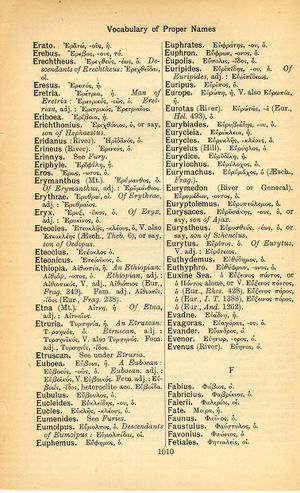Eretria
πρῶτον μὲν οὖν ὄστρεια παρὰ Νηρεῖ τινι ἰδὼν γέροντι φυκί ἠμφιεσμένα ἔλαβον ἐχίνους τ' ἐστὶ γὰρ προοίμιον δείπνου χαριέντως ταῦτα πεπρυτανευμένου → So first I spotted oysters wrapped in seaweed at the shop of some old Nereus, and sea urchins, which I bought; these were the appetizers for a delightfully managed dinner
English > Greek (Woodhouse)
Ἐρέτρια, ἡ.
Man of Eretria: Ἐρετριεύς, -ιῶς, ὁ.
Eretrian, adj.: Ἐρετρικός, Ἐρετριαῖος.
Latin > English (Lewis & Short)
Ĕrĕtrĭa: ae, f., = Ἐρετρία.
I The principal city on the island of Euboea, the birthplace of the philosopher Menedemus, now Palaeo Castro, Plaut. Merc. 3, 4, 59; Mel. 2, 7, 9; Plin. 4, 12, 21, § 64; Cic. Ac. 2, 42; Liv. 32, 16; 35, 38 al.—
B Derivv.,
1 Ĕrĕtrĭus, a, um, adj., Eretrian: creta, Plin. 33, 13, 57, § 163; so, terra, Cels. 5, 15; 6, 3.—Subst.: Eretria, ae, f., Plin. 35, 6, 21, § 38; Vitr. 7, 14.—
2 Ĕrĕtrĭ-ensis, e, adj., of Eretria: Gongylus, Nep. Paus. 2.—Subst., Ĕrĕtrienses, ium, m., the inhabitants of Eretria, Liv. 35, 38.—
3 Ĕrĕtrĭăci, ōrum, m., philosophers of the school of Menedemus, Cic. Ac. 2, 42, 109. —Also called,
4 Ĕrĕtrĭci, ōrum., m., Cic. de Or. 3, 17; Sen. Ep. 88 fin.—In sing.: Ĕrĕtrĭcus, an Eretrian philosopher, Cic. Tusc. 5, 39.—
II A city of Thessaly, in Phthiotis, now Tzangli, Liv. 32, 13; 33, 6.

